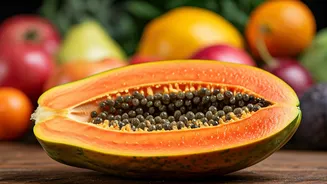Peppermint Power
Peppermint has been a remedy for digestive issues for generations, and there's a good reason why. Peppermint's key component, menthol, has antispasmodic
properties. It soothes the muscles in your digestive tract, helping to alleviate bloating and gas by promoting smoother passage of food. You can enjoy peppermint in various forms such as tea, supplements, or simply by adding fresh peppermint leaves to your dishes. Additionally, peppermint oil capsules have shown promise in reducing irritable bowel syndrome (IBS) symptoms, which frequently include gas and bloating. Remember to consider individual tolerance levels when incorporating peppermint into your diet, and consult with a healthcare professional if you experience persistent digestive problems.
Ginger's Gentle Touch
Ginger, a common ingredient in Indian cuisine, has potent anti-inflammatory properties, making it an excellent aid for digestive health. It works by stimulating gastric emptying, which means your stomach processes food more quickly, reducing the chances of gas build-up. Ginger can also help reduce inflammation in the intestines, further alleviating bloating. You can use ginger in several ways. Brew a soothing cup of ginger tea or add fresh ginger to your meals. Chewing a small piece of fresh ginger after meals can also offer relief. Remember that while ginger is generally safe, consuming large quantities might lead to mild heartburn for some individuals. Consulting your doctor is wise if you have an underlying medical condition.
Fennel Seeds' Aid
Fennel seeds, often consumed as a mouth freshener, possess powerful carminative properties. Carminatives help to expel gas from the intestines, relieving bloating and discomfort. These seeds contain compounds that relax the intestinal muscles, reducing spasms and facilitating easier digestion. Fennel seeds are commonly available and easy to use. Chew them directly after a meal, or steep them in hot water to make a soothing tea. Incorporating fennel seeds into your diet is a simple yet effective method to reduce gas and bloating. However, if you are pregnant or nursing, consult your physician before increasing your fennel intake.
Turmeric's Benefits
Turmeric, a vibrant yellow spice, contains curcumin, a compound with potent anti-inflammatory properties. This compound can reduce inflammation in the digestive system, which often contributes to bloating and gas. Curcumin can also enhance bile production, assisting in fat digestion and further preventing gas formation. To benefit from turmeric, incorporate it generously in your cooking by adding it to curries, soups, and vegetable dishes. Another option is taking turmeric supplements; however, it's wise to discuss this with a healthcare provider, especially if you take blood thinners or have any existing health issues. Using turmeric regularly offers a natural way to support digestive health.
Chamomile's Calm
Chamomile is well known for its calming effects, not only on the mind but also on the digestive system. It relaxes the muscles in your digestive tract, which helps reduce cramping and gas. Chamomile also has anti-inflammatory properties, providing further relief from bloating. Chamomile tea is a traditional remedy for digestive upset and is easily accessible. Drinking a cup after meals can ease discomfort. The gentle nature of chamomile makes it suitable for many, but always check for potential allergies. If you are pregnant or breastfeeding, discuss chamomile consumption with your healthcare provider.
Pineapple's Power
Pineapple is rich in an enzyme called bromelain. Bromelain aids in breaking down proteins, thus facilitating smoother digestion and reducing gas and bloating. This enzyme also has anti-inflammatory properties, supporting gut health. Consuming fresh pineapple or drinking pineapple juice can help. Consider incorporating pineapple as a snack or dessert after a meal. Always be mindful of the quantity consumed, as excessive pineapple intake may cause oral irritation. Those with certain allergies should be cautious, and it’s best to speak with your doctor if you have any doubts about adding pineapple to your diet.
Bananas' Digestive Ease
Bananas are high in potassium and fiber. Fiber supports regular bowel movements, preventing constipation, which is a common cause of bloating. Potassium helps regulate fluid balance and reduce water retention, further minimizing bloating. Bananas can be a beneficial part of your daily diet. Eat them as a snack, add them to your breakfast, or blend them into a smoothie. Ensure they are ripe because unripe bananas can worsen bloating for some people. Bananas are a generally safe and accessible option for improving digestive wellness, though they should be balanced with other nutrients as part of a varied diet.
Yogurt's Probiotics
Yogurt containing live and active cultures introduces beneficial bacteria, known as probiotics, to your gut. These bacteria help maintain a healthy balance in your gut microbiome, thus improving digestion and reducing gas and bloating. Probiotics can also aid in breaking down food, preventing gas build-up. Choose yogurts with the 'live and active cultures' label on the packaging. Consume yogurt regularly as part of your meals or snacks. Be mindful of added sugars in some yogurts; opting for plain yogurt and adding your fruits is a healthier choice. Incorporating probiotic-rich yogurt into your diet can significantly improve your digestive health.
Cucumber's Hydration
Cucumbers are high in water content and can help with hydration, which is essential for healthy digestion. Adequate hydration prevents constipation, a frequent cause of bloating. Cucumbers are also low in calories and easy to digest. You can enjoy cucumbers in salads, snacks, or even infused in water. The fiber content in cucumbers also promotes regular bowel movements. This refreshing vegetable is a simple yet effective addition to your diet. Incorporating cucumber provides a refreshing and healthy way to support digestive health and maintain overall wellness. Enjoy it as part of your balanced diet.
Spinach's Nutrients
Spinach is rich in nutrients and fiber, essential for healthy digestion. Fiber promotes regular bowel movements, preventing constipation, which often leads to bloating and gas. Spinach also contains various vitamins and minerals supporting overall gut health. You can add spinach to salads, soups, or smoothies. Ensure you cook spinach correctly to optimize nutrient absorption. Steaming or lightly sautéing spinach helps preserve its nutrients. Regularly including spinach as part of your balanced diet contributes to digestive health and overall wellness, making it a simple yet effective choice for managing bloating and gas.














